Domestic violence: Teaching kids skills to stay safe in relationships, prevent abuse
This special report was underwritten in part with a grant from the University of Southern California's Annenberg Center for Health Journalism and its 2021 Domestic Violence Impact Reporting Fund.
Other parts of this story include:
Part 1: Legacy of domestic violence handed from one generation to the next by Anne Saker
Part 2: How a Cincinnati domestic violence survivor got the help she needed to break the cycle by Cameron Knight
What are adverse childhood experiences? Seeing domestic violence is one of them. by Anne Saker
How The Enquirer uncovered family histories of domestic violence in Hamilton County by Quinlan Bentley
Watch: Enquirer hosts conversation on domestic violence
Hand-signal rescue of Kentucky girl shows 'power of a bystander'
Murder case in Enquirer's domestic-violence series ends with 15-to-life prison sentence
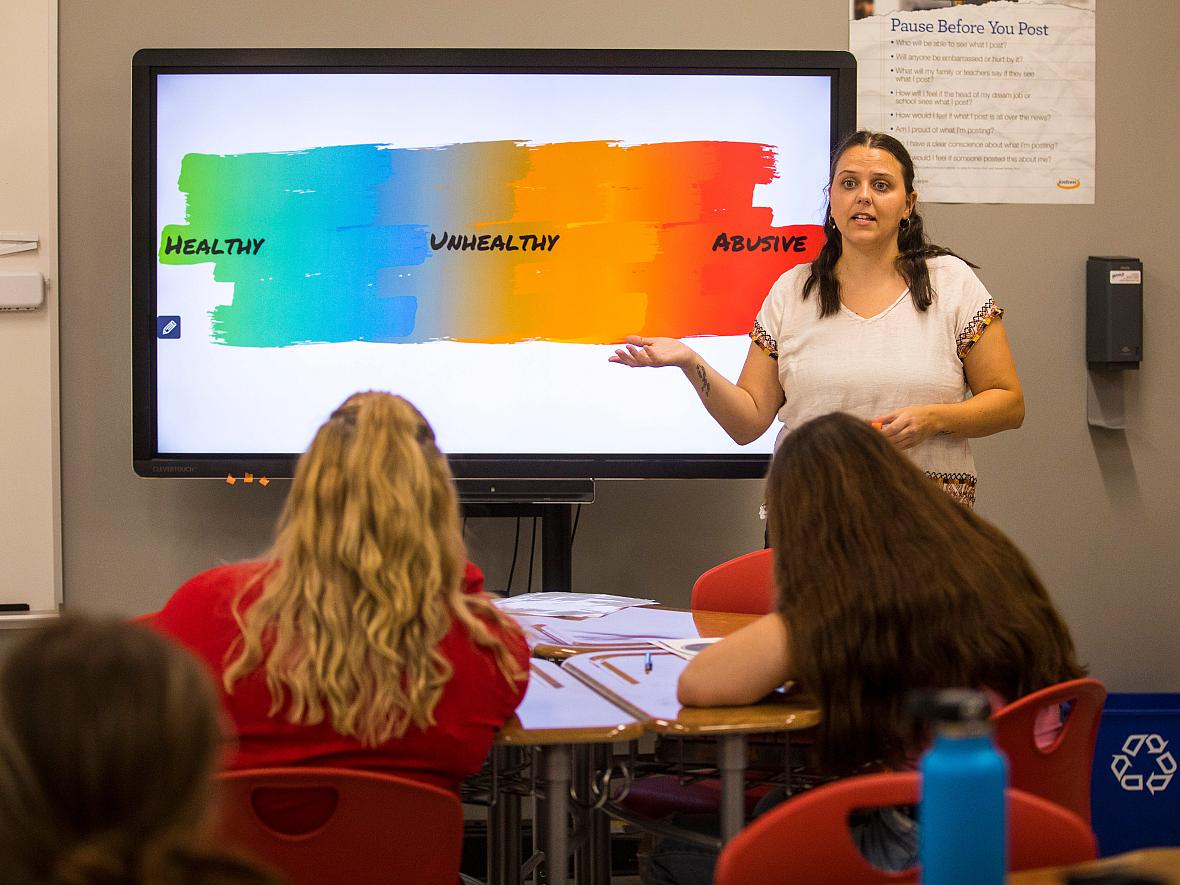
Schools educating students about violence prevention Schools across Ohio and Kentucky are now teaching violence prevention courses in high school and social-emotional learning in grade school.
Cincinnati Enquirer
By Terry DeMio
Joking tops the checklist. It might seem innocuous, but it is the first red flag in a sequence of progressively degrading and dangerous behaviors defined as emotional violence. Pinching leads a list of behaviors in a continuum of physical violence. The end of each list: Death.
Teenage students in a Warren County school received the lists during a class called Positive Outcomes When Expecting Respect, taught by violence-prevention specialists.
“One girl took it home to her mom and showed her where she thought she was on the abuse continuum,” said Megan Crouch, prevention director for the Violence Free Coalition of Warren County. The mom took her daughter’s distress seriously and showed up at the Abuse and Rape Crisis Shelter.
"I want to thank you for talking to my class about abusive relationships," the girl wrote in a program evaluation. "It’s very vital information that I have unfortunately watched my mother experience. The information you shared has probably saved someone’s life in the past and will help in the future."
Taylor Collins, 17, a senior, takes part in weeklong teen violence-prevention and healthy relationships program called Power. Holly Smith, a community prevention coordinator with Abuse and Rape Crisis Shelter in Warren County leads the class. On day two, students had to decide if scenarios given to them were healthy, unhealthy, abusive or somewhere in the middle. LIZ DUFOUR/THE ENQUIRER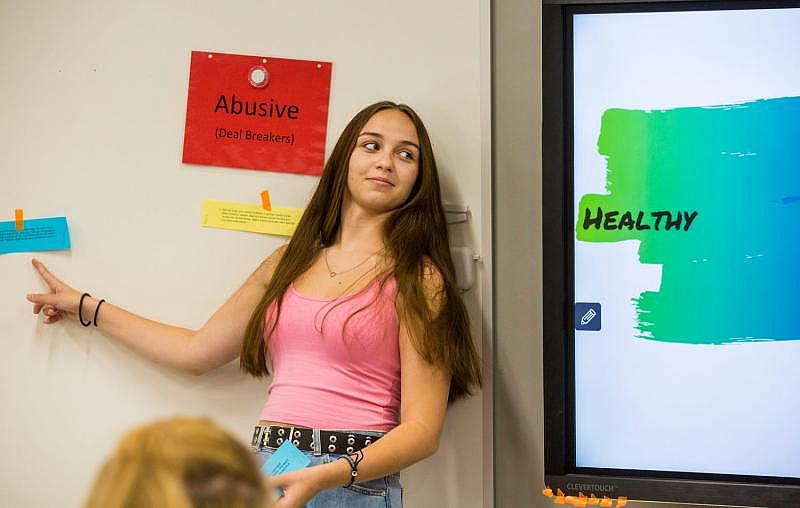
Learning what not to accept or do
Across the Cincinnati area, students are getting violence prevention lessons that experts say can end intergenerational domestic violence, and other unhealthy relationships.
Some of the students may have already observed unhealthy examples at home. A recent Enquirer analysis of Hamilton County’s domestic violence cases found that one in four perpetrators and survivors in cases from April 2020 had known in childhood a relative, often a parent, who had been arrested for domestic violence.
The classes aimed at prevention are different from traditional academic courses, but they are considered essential learning in some states, including Ohio and Kentucky.
A decade of violence: Youth gun violence alarming, and it has been at this level for a decade
The lessons are hands on, so that after kids learn a concept, they can revisit and "practice" it. Sometimes, they can take home pieces of what they learned, such as the cards that the Warren County girl took home to show her mother. Specialists from the Violence Free Prevention Coalition of Warren County are in all eight school districts in the county with several programs. One, Positive Outcomes When Expecting Respect, or Power, teaches about sexual assault, harassment, bullying and healthy relationships.
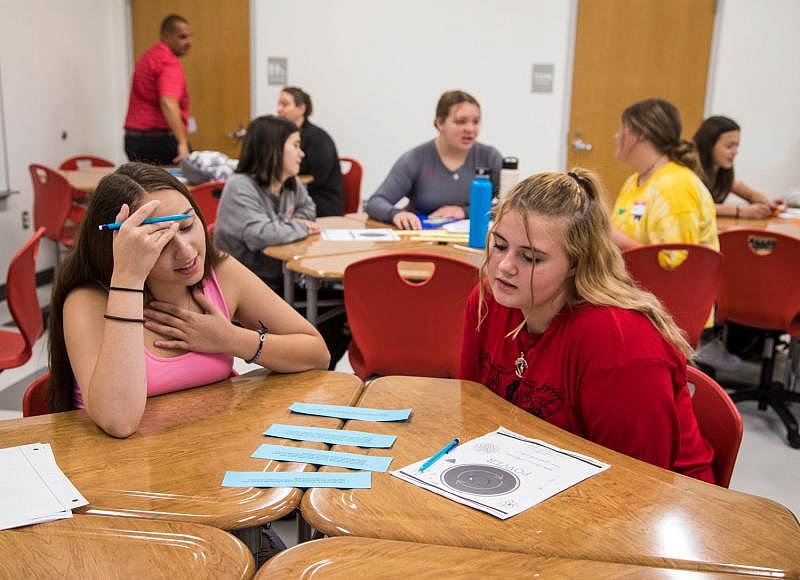
In Hamilton and Butler counties, Women Helping Women, a Cincinnati nonprofit working to end gender-based violence, is in more than 25 middle- and high schools with its five-day program, Prevent & Empower.
Jaiden Coleman, a freshman at Clark Montessori High School, takes part in a spectrum-of-violence activity during a Women Helping Women Prevent & Empower session on Sept. 23, 2021. Students were given sticky notes with scenarios and had to decide if the behavior was criminal, dangerous or obnoxious. The class teaches students about healthy relationships, what's not healthy, boundary-setting, consent and more. It is designed to prevent future gender-based violence. LIZ DUFOUR/THE ENQUIRER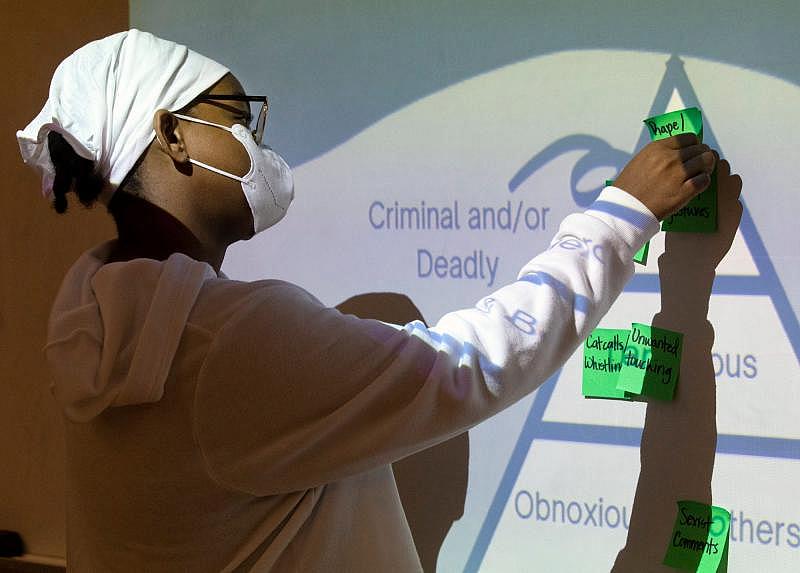
In one lesson Sept. 23, students at Clark Montessori High School in Hyde Park were given scenarios – a girl incessantly texts her boyfriend; a boy takes pictures of a girl's skirt from behind. The kids broke up into small groups to discuss the scenarios. Is the identified behavior OK? If not, how would you intervene? Would you distract the person from what they're doing? Tell a teacher? Ignore the behavior? Why?
A closer look: Want to learn more about preventing domestic violence? Here are local resources
Specialists say the education helps strengthen kids' understanding of what is OK in a relationship, how to set boundaries and empathy. In the United States, about one in three teens 14 to 20 have been victims of dating violence, and about the same number say they have committed relationship violence, the U.S. Department of Education reports. The programs in Cincinnati area schools are evidence-based, meaning their outcomes have been tested and promise positive results for kids, young adults, and future relationships.
A review of 53 studies found that universal school-based violence prevention programs, provided to all students in a grade or a school, led to reduced violent behavior at all grade levels, the U.S. Centers for Disease Control and Prevention says.
In another study, researchers examined the same group of students four years after they received the program Safe Dates. Students who had the lessons reported 56% to 92% less physical, serious physical, and sexual dating violence victimization and perpetration than teens who did not. Safe Dates is among several anti-violence programs offered to Cincinnati-area students.
The pandemic's school shutdowns last year erased some violence prevention lessons, specialists say. One example: The YWCA of Greater Cincinnati's violence-prevention classes, which are in 23 schools, served 3,792 students in 2020, compared with 4,969 students in 2019. “The dip in numbers was due to difficulties getting virtual access to students due to COVID restrictions on in-person groups,” said Jennifer Milani, YWCA senior director.
The prevention specialists want to saturate schools with the lessons, preferably face to face, helping kids identify threats, showing them how to be safe and helping them build the confidence they need to prevent violence themselves.
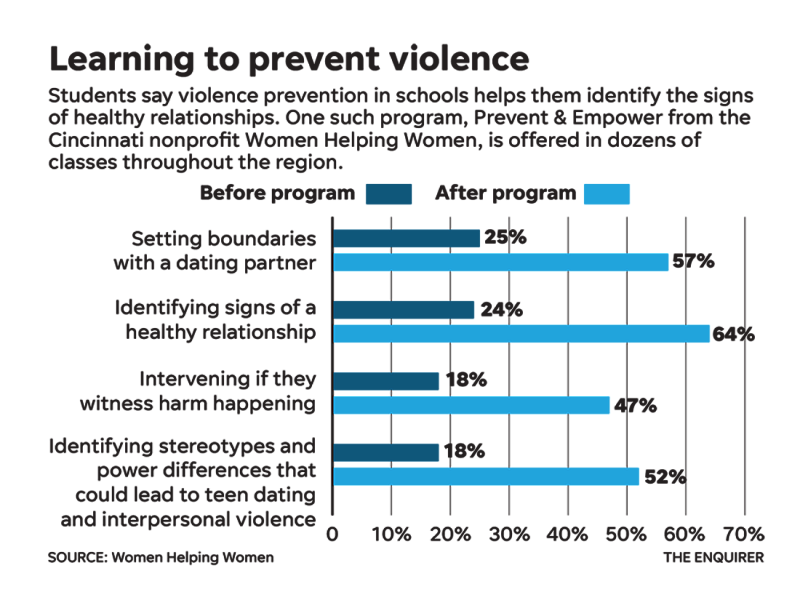
Starting early to teach strength, empathy
The lessons on intimate relationships are targeted to adolescents. But there's another kind of learning for pre-school through elementary school-aged children called social-emotional learning. It's considered "whole-child" education, teaching children self-awareness, helping them gain confidence, manage their emotions, feel empathy for others and solve problems.
Beech Acres Parenting Center in Anderson Township developed an evidence-based social-emotional learning program called the Character Effect in 2017. In the 2020-2021 school year, it reached more than 19,000 students, teachers and parents across the nation, including 29 schools in the Cincinnati region.
First-grader Ella Siciliano colors the word 'intentional' during a class at J.F. Burns Elementary on Aug. 31. The class was getting a session on the Character Effect, a social-emotional learning program that helps kids learn their own positive character traits and identify those of others. Beech Acres Parenting Center trains teachers in the program who then teach their students. LIZ DUFOUR/THE ENQUIRER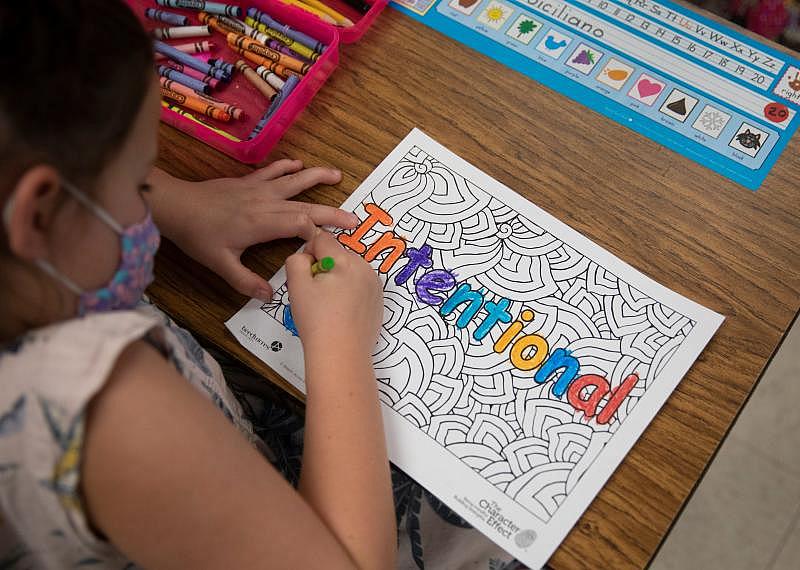
The program helps children build resilience through their own character strengths. It helps them understand their own emotions, encouraging mindfulness. It can teach children coping mechanisms or build resilience through character strengths, said Jaimi Cabrera, director of the Character Effect. "It can mitigate the effects of adverse childhood experiences such as witnessing domestic violence,” she said. "These core competencies are key to children’s growth. I believe that they’re highly important, focusing within the entire school community that that can definitely make a difference in that hopeful future.”
First, teachers are taught the program, then they deliver it to children in classrooms. There are also continuing education programs that teach social-emotional learning.
Walk into a classroom at Dorothy Howell Elementary in the Erlanger/Elsmere Independent School district, and you might see a child writing the word bravery – or any of 24 character traits – on a card and placing it in a box. Children here are learning to identify positive character traits in themselves and in others. They're encouraged to use character-spotting cards to share traits they see in other students.
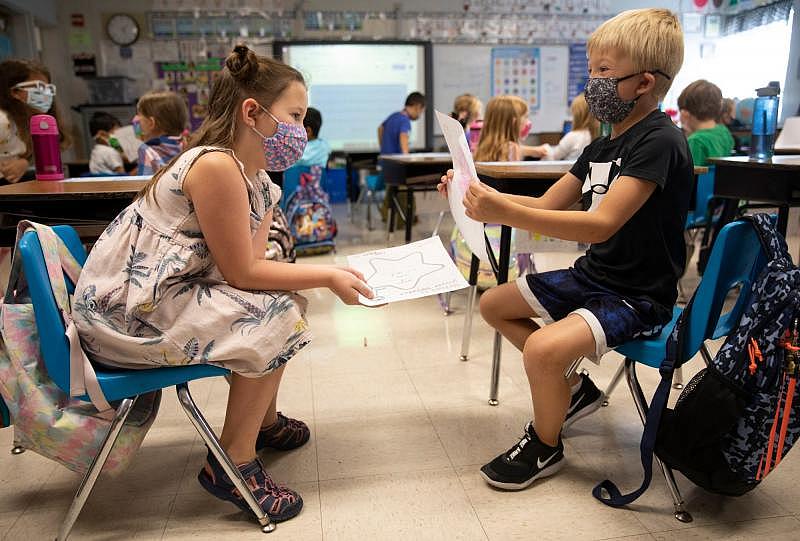
This is the Character Effect in action, said principal Tiffany Gruen. “The Character Effect focuses on the strengths of our students and each other. They look at each other through that lens, see the good in people.”
Social-emotional learning was developed in 1994. But it has only been required by states, including Ohio and Kentucky, in the past five years.
Recently, there has been opposition from some parents who believe that social-emotional learning is the indoctrination of children. One grassroots conservative group, Protect Ohio Children, suggests that this type of learning can intrude on family privacy and make children "vulnerable to psychological manipulation," among other criticisms.
A Facebook page of the south Ohio branch of the group, which is opposed to having schools teach critical race theory and comprehensive sex education, singled out Lakota schools for making social-emotional learning one of its "special" classes for K-sixth graders along with music, gym and STEAM (science, technology, engineering, the arts and math).
Working with teens to curb violence
Women Helping Women sees the impact of its Prevent & Empower program in student evaluations.
“The most helpful part was hearing that you don’t have to end up like your parents," one student wrote. "I have grown up with my parents' fights all the time, and now I know there are steps I can take to avoid unhealthy relationships."
"Prevent & Empower is specifically geared toward preventing future instances of gender-based violence," said Maria Cole, Women Helping Women prevention manager. "We teach students about boundary-setting, healthy communication, consent and healthy relationships because these types of skills have been proven to help youth make healthier relationship decisions in the future.
Savannah Slaby, Women Helping Women educator, leads a session on Prevent & Empower at Clark Montessori High School on Sept. 23, 2021. The five-hour course is taught in more than 20 health classes in Hamilton and Butler counties. Students learn about healthy and unhealthy relationships boundary-setting, healthy communication and consent. It is designed to prevent gender-based violence. LIZ DUFOUR/THE ENQUIRER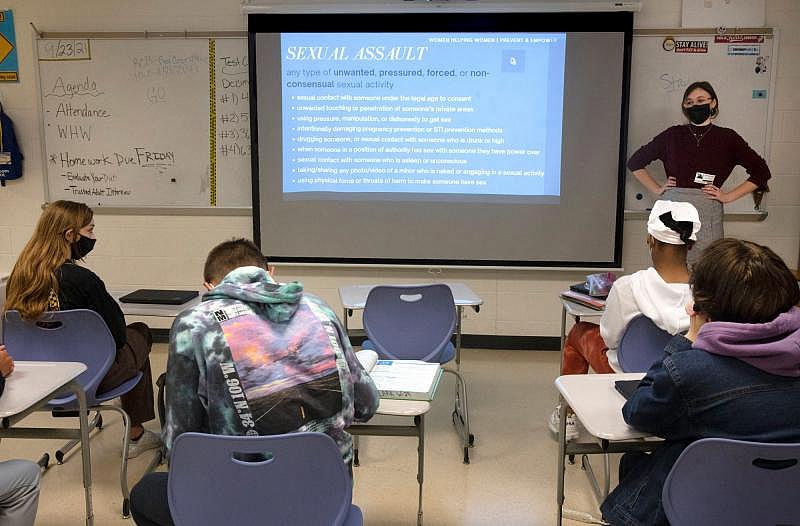
"If students are equipped with these skills from an early age," she said, "these new social norms – asking for consent, gender equity, setting healthy boundaries – are the foundation on which they build intimate relationships.”
Women Helping Women reaches 2,500 to 3,500 students each academic year. “In the next five years, we would like to increase that number to 25,000 total, 5,000 per year,” Cole said.
YWCA of Greater Cincinnati specialists provide a variety of violence-prevention strategies. One, Coaching Boys Into Men, trains team coaches, who then help their male athletes develop appropriate relationships and views about their relationships with girls. Milani said the program, at Riverview East Academy High School, Taft High School and Shroder High, is well-received.
“Our young male athletes respond positively and are able to identify behaviors in pro athletes that are not acceptable,” Milani said. “They really are able to move beyond that team mentality and develop their own sense of awareness about how their behavior can impact their female counterparts.”
All of the programs are free to schools: The agencies' work is often funded with grants. Some receive rape prevention education funds through the Ohio Department of Health and the Violence Against Women Act. Some get support from Cincinnati's Human Services Fund.
Violence Free Coalition of Warren County is not only in schools but also is embedded in the community with anti-violence messaging and a Teen Alliance Council.
The Ion Center, formerly Northern Kentucky Women's Crisis Center, teaches Green Dot, a strategy that empowers bystanders to help change social and cultural norms and prevent violence, in Maysville and Covington.
Jordan Harkins, an Ohio State University student, was a Teen Alliance Council member and president while at Kings Local High School in Warren County. She takes the violence-prevention lessons seriously even now, she says. PROVIDED.
Lori Droege, the Ion Center’s public health specialist and director of prevention and public education, said the program is well-received. "In Maysville, we have worked with community members … since 2015, starting with faith-based communities and branching out into things like nonprofits, education, businesses and city/county government." In Covington, the specialists go to small businesses, such as bars, with the program.
Women Helping Women spreads violence-prevention messaging to businesses too, Cole said. Together with the school education, she said, "This will create a wave of culture change toward safer … communities and students who are well-equipped to have healthy relationships moving forward."
Change through a student at a time
The violence-prevention advocates believe in their programs and say that, in time, the impact will be realized on a societal level. They note that it is only recently that their students have entered adulthood and had the chance to take their lessons into the world.
Jordan Harkins is a third-year Ohio State University student who grew up in Maineville, Warren County. She joined the county's Violence Free Coalition's Teen Alliance Council as a junior at Kings Local High School. The council's mission: to promote healthy relationships and maintain a substance-free life.
“I decided to join because I knew that kids my age weren’t going to listen to adults chastising them about these topics," Harkins said.
Harkins said the Teen Alliance Council gave her confidence, and when she's entering a relationship – platonic or romantic – she considers what she's learned. She is adamant that all kids, no matter their gender, need school-based violence prevention education.
First-grader Killian Ernst raises his hand during class to share his wish at J.F. Burns Elementary, Aug. 31, 2021. Ernst told his teacher, Julie Fischer, his wish was to make the world a better place. Fischer teaches the Character Effect, an evidence-based program developed by Beech Acres Parenting Center. It is a social-emotional intelligence program that helps kids with resilience by identifying their own positive character traits and those of others. LIZ DUFOUR/THE ENQUIRER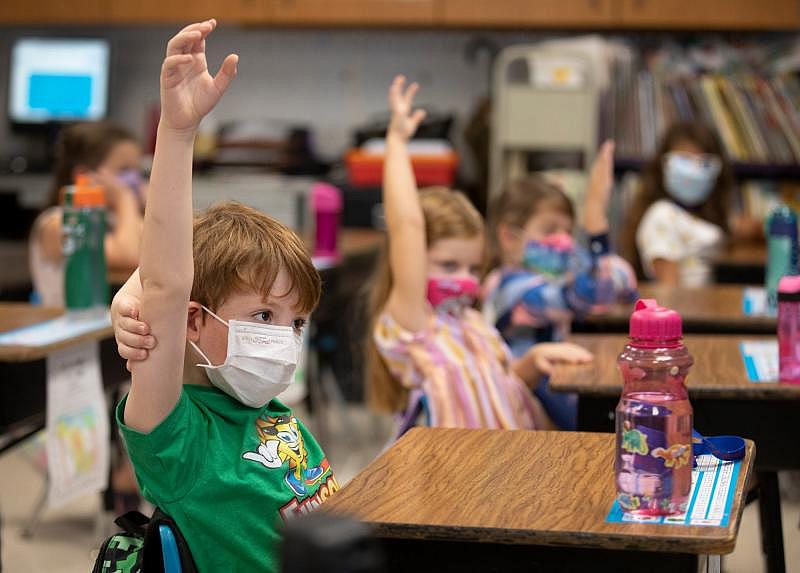
"I get sick to my stomach when I see situations like Gabby Petito's, where, if the education was more accessible to young women and young men, there would be opportunities for prevention. It's disturbing to see those situations and not be able to do something, because when we're getting the information about something that happened, it's always too late."
Beyond the bruises
A three-part Enquirer report on the reality and legacy of domestic violence and what's being done about it in the Cincinnati region.
- Part one: An Enquirer analysis of court dockets and the lives tied to them reveals a painful generational legacy: about one in four perpetrators and survivors knew at least one relative arrested for domestic violence.
- Part two: After a death threat, a survivor found the cops at her door - along with an advocate to help her make a plan for her future safety.
- This is part three: Across the Cincinnati region and Northern Kentucky, students get lessons that can end the cycle of relationship violence and help identify red-flag behaviors against them.
[This article was originally published by Cincinnati.com.]

